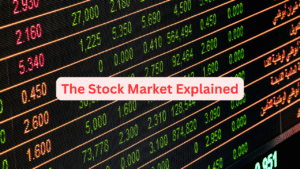 How the Stock Market Works
How the Stock Market Works
The stock market is often seen as a fast-moving, complex place where fortunes are made and lost. But at its core, it’s a system built to help companies raise money and allow individuals to invest in their growth. Understanding how it works is key to building wealth and making smarter financial decisions.
What Is the Stock Market?
The stock market is a collection of markets and exchanges where shares of publicly held companies are issued, bought, and sold. It functions as both a primary market (for initial public offerings or IPOs) and a secondary market (for trading existing shares).
Major stock exchanges include:
- New York Stock Exchange (NYSE)
- NASDAQ
- London Stock Exchange (LSE)
- Tokyo Stock Exchange (TSE)
The Purpose of the Stock Market
The stock market exists for two main reasons:
- To Help Companies Raise Capital
Companies issue shares to the public in return for capital that can be used for expansion, product development, or reducing debt. - To Provide Investment Opportunities
Investors can buy pieces of companies in the form of stocks. Over time, they may profit through dividends and rising share prices.
Key Players in the Stock Market
- Retail Investors: Everyday people like you and me investing for personal goals.
- Institutional Investors: Banks, pension funds, hedge funds, etc., that trade in large volumes.
- Market Makers: Firms that provide liquidity by buying and selling stocks to keep the market functioning.
- Brokers: Intermediaries that allow individuals and institutions to buy and sell stocks.
How a Trade Works
Here’s a simplified view of how a trade happens:
- You log into your brokerage account and place a buy order for 10 shares of Apple.
- The order is sent to the stock exchange.
- A market maker matches your buy order with a seller’s offer.
- The transaction is executed, and the shares appear in your account.
The trade process is nearly instantaneous today, thanks to electronic trading platforms.
Stock Prices: What Makes Them Move?
Stock prices fluctuate constantly based on supply and demand. Several factors influence this:
- Company performance (earnings reports, management changes)
- Economic indicators (inflation, interest rates, GDP growth)
- Global events (wars, pandemics, elections)
- Market sentiment (investor confidence, fear, or excitement)
When more people want to buy a stock than sell it, the price goes up. When more want to sell, the price falls.
Primary vs Secondary Market
- Primary Market: Where stocks are created. This is where a company issues new shares through an IPO.
- Secondary Market: Where stocks are traded between investors. This is the market most people refer to when they say “stock market.”
Market Indexes
Market indexes track the performance of a group of stocks to give a snapshot of the market’s health.
Popular indexes include:
- S&P 500: Tracks 500 large U.S. companies.
- Dow Jones Industrial Average: Follows 30 blue-chip companies.
- Nasdaq Composite: Heavily weighted toward tech stocks.
These indexes help investors understand broader market trends.
How Investors Make Money
There are two primary ways to earn returns:
- Capital Gains: Buy low, sell high. You profit when a stock increases in value.
- Dividends: Some companies pay shareholders a portion of their earnings regularly.
Over time, compounding returns from reinvested dividends and rising stock prices can significantly grow wealth.
Risks of the Stock Market
While investing can be rewarding, it also carries risks:
- Market Volatility: Prices can swing wildly.
- Company-Specific Risk: A poor decision by management can tank a stock.
- Economic Downturns: Recessions can drag down the entire market.
Investors manage these risks through diversification, long-term thinking, and research.
✅ FAQ: How the Stock Market Works
1. What is the difference between stocks and shares?
They are essentially the same thing. “Stock” refers to ownership in one or more companies, while “shares” refer to the units of ownership in a particular company.
2. Is the stock market the same as a stock exchange?
Not quite. A stock exchange (like the NYSE) is a specific platform where stocks are traded. The stock market refers to the overall system of buying and selling stocks.
3. How do I start investing in the stock market?
You’ll need to open a brokerage account, fund it, and then choose stocks or ETFs to invest in based on your financial goals and risk tolerance.
4. Why do stock prices change every second?
Prices change due to real-time shifts in supply and demand influenced by news, earnings, sentiment, and economic data.
5. Is the stock market safe?
No investment is entirely without risk. However, historically, the stock market has provided solid long-term returns. Diversification and time in the market are key to managing risk.
